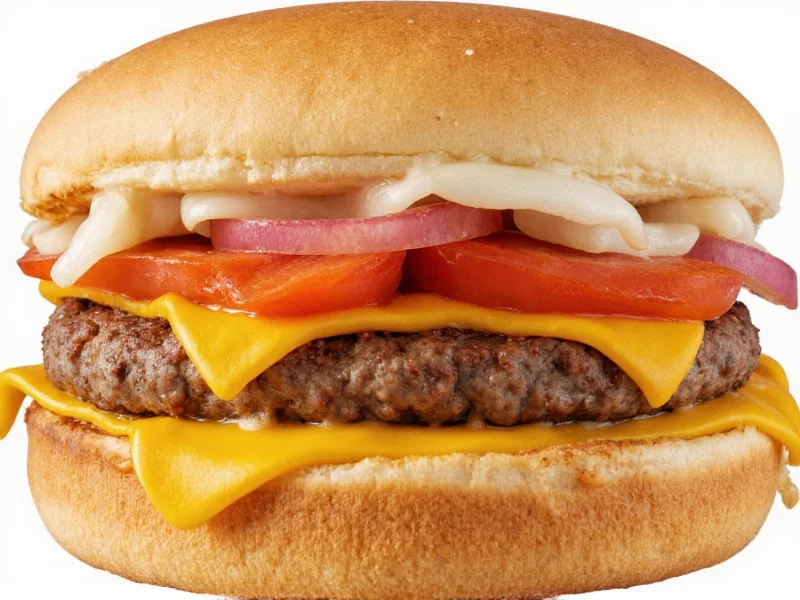Understanding the nutritional profile of fast food breakfast items is essential for making informed dietary choices. The Sausage McMuffin remains one of McDonald's most popular morning menu items, but its calorie content warrants attention for those monitoring their daily intake.
Nutritional Breakdown of the Sausage McMuffin
While the total calorie count stands at 400, examining the complete nutritional composition provides better context for how this breakfast sandwich fits into a balanced diet. The calorie distribution comes primarily from fats and carbohydrates, with protein contributing a significant portion as well.
| Nutrient | Amount | % Daily Value* |
|---|---|---|
| Calories | 400 | 20% |
| Total Fat | 24g | 31% |
| Saturated Fat | 10g | 50% |
| Trans Fat | 0.5g | - |
| Cholesterol | 70mg | 23% |
| Sodium | 850mg | 37% |
| Total Carbohydrates | 29g | 10% |
| Dietary Fiber | 1g | 4% |
| Sugars | 2g | - |
| Protein | 18g | - |
*Percent Daily Values are based on a 2,000 calorie diet. Your daily values may be higher or lower depending on your calorie needs.
Understanding the Calorie Composition
The 400 calories in a Sausage McMuffin come from three primary sources. Approximately 54% of the calories derive from fat (24g), 26% from carbohydrates (29g), and 18% from protein (18g). This distribution explains why the sandwich feels satisfying but also contributes significantly to daily recommended limits for certain nutrients.
The high saturated fat content (10g, or 50% of the daily recommended limit) primarily comes from the sausage patty and cheese. Sodium levels (850mg) represent 37% of the recommended daily maximum, which is noteworthy for those monitoring blood pressure or following low-sodium diets.
How the Sausage McMuffin Compares to Other Breakfast Options
When evaluating how many calories in a sausage mcmuffin compared to alternatives, consider these common breakfast choices:
| Breakfast Item | Calories | Protein (g) | Sodium (mg) |
|---|---|---|---|
| Sausage McMuffin | 400 | 18 | 850 |
| Egg McMuffin | 300 | 14 | 730 |
| Hash Brown | 140 | 2 | 190 |
| Plain Bagel | 280 | 10 | 450 |
| Greek Yogurt with Berries | 180 | 17 | 50 |
This comparison shows that the sausage mcmuffin nutrition facts reveal it as one of the higher-calorie breakfast sandwich options at McDonald's. The Egg McMuffin provides a lower-calorie alternative with similar protein content but less saturated fat and sodium.
Considering Dietary Goals and Calorie Needs
For most adults, a 400-calorie breakfast represents approximately 20% of a standard 2,000-calorie daily intake. Those following calorie-restricted diets for weight management might find this substantial for a single meal component. Active individuals with higher caloric needs may find the protein content (18g) beneficial for satiety throughout the morning.
Individuals monitoring specific health markers should note that the sausage mcmuffin calorie count comes with significant amounts of saturated fat and sodium. Those with cardiovascular concerns might want to consider lower-sodium alternatives or enjoy this item occasionally rather than regularly.
Customization Options to Reduce Calorie Content
McDonald's allows customization that can reduce the calorie content of the Sausage McMuffin:
- Order without cheese: Reduces calories by approximately 60 and saturated fat by 4g
- Request egg whites instead of sausage: Creates a significantly lower-fat option
- Ask for light cheese: Further reduces fat content
- Pair with fruit instead of hash browns: Avoids additional 140 calories
These modifications demonstrate how understanding mcdonald's sausage mcmuffin calorie count empowers consumers to make adjustments that better align with their nutritional goals.
Putting the Numbers in Context
While the 400 calories in a Sausage McMuffin might seem high at first glance, it's important to consider the complete nutritional picture. The 18g of protein provides substantial satiety, potentially reducing overall calorie consumption later in the day. The English muffin contributes complex carbohydrates that provide sustained energy release compared to simple sugars.
For those wondering is sausage mcmuffin high in calories, the answer depends on individual dietary needs and overall eating patterns. As an occasional breakfast choice, it can fit within a balanced diet. As a regular daily option, it might contribute to excessive saturated fat and sodium intake for some individuals.
Final Considerations for Health-Conscious Consumers
When incorporating items like the Sausage McMuffin into your diet, consider these factors:
- Frequency of consumption: Occasional enjoyment differs from daily intake
- Total daily nutrient balance: How this item fits with other meals
- Individual health conditions: Those with hypertension should monitor sodium
- Activity level: More active individuals may accommodate higher calorie foods
- Personal dietary goals: Weight loss, maintenance, or muscle building
Understanding the complete nutritional value of sausage mcmuffin helps consumers make informed decisions rather than simply focusing on the calorie count in isolation. The protein content provides valuable nutrients, while the saturated fat and sodium warrant mindful consumption.











 浙公网安备
33010002000092号
浙公网安备
33010002000092号 浙B2-20120091-4
浙B2-20120091-4